英语练习小结表格
- 格式:doc
- 大小:29.00 KB
- 文档页数:1

人称代词表格用法及练习-标准化文件发布号:(9456-EUATWK-MWUB-WUNN-INNUL-DDQTY-KII小学人称代词表格用法及练习英语人称代词和物主代词一、人称代词表示“我”、“你”、“他”、“她”、“它”、“我们”、“你们”、“他们”的词,叫做人称人称代词主格:做主语,表示xxx怎么样了、干什么了。
I am a teacher. You are student. He is a student, too.We/You/They are students.人称代词宾格作宾语,表示动作行为的对象。
Give it to me. Let’s go (let’s =let us).二、物主代词表示所有关系的代词叫做物主代词,也可叫做代词所有格。
形容词性物主代词形容词性物主代词 (my/your/his/her/its/our/their) +名词名词性的物主代词:相当于一个名词,I. 人称代词:人称代词又分为主格和宾格形式.主格通常做主语。
宾格通常做动词或介词的宾语.Eg: a. I’m a nurse.b.Could you help mec.d.e.Mum often takes us to the park on Sunday.f.It’s a cat. We call it “ Mimi.”g.Who knows himh.i.j.They are going to the cinema with her.II. 物主代词又分为形容词性的物主代词和名词性的物主代词.形容词性的物主代词:相当于形容词,后面要跟名词,指定名词的所属对象.名词性的物主代词:相当于一个名词,必须单独使用,后面不能再跟名词.Eg: a. Your school is small, mine is big.(=my school)b. This is not your pen. Yours is on the desk.(=your pen)c. Whose book is that It’s hers. (=her book)d. Their classroom is on the second floor. Ours is on the third floor. (=our classroom)e. Her bike is black. His is grey. Mine is blue.(=his bike, my bike) g. Those aren’t our books. Ours are on the floor. Those books are theirs.(=our /their books )*人称代词划线,常用who (宾格可用whom)提问.物主代词划线常用whose提问。

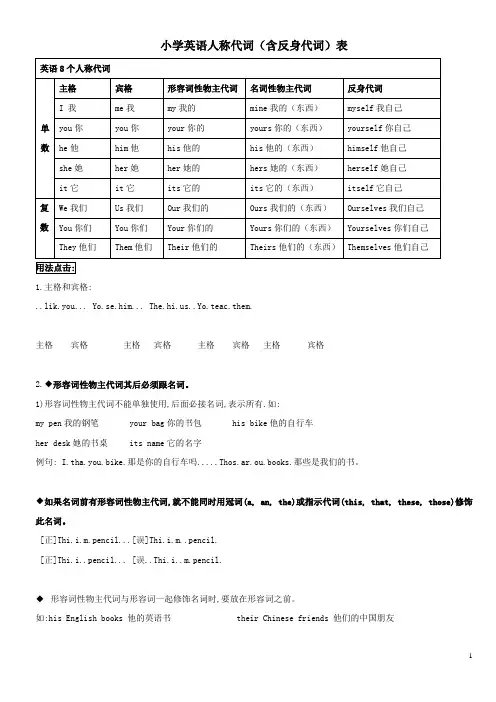
小学英语人称代词(含反身代词)表1.主格和宾格:..lik.you... Yo.se.him... ..Yo.teac.them.主格宾格主格宾格主格宾格主格宾格2.◆形容词性物主代词其后必须跟名词。
1)形容词性物主代词不能单独使用,后面必接名词,表示所有.如:my pen我的钢笔 your bag你的书包 his bike他的自行车her desk她的书桌 its name它的名字例句: I.tha.you.bike.那是你的自行车吗.....Thos.ar.ou.books.那些是我们的书。
◆如果名词前有形容词性物主代词,就不能同时用冠词(a, an, the)或指示代词(this, that, these, those)修饰此名词。
[正]Thi.i.m.pencil...[误]Thi.i.m..pencil.[正]Thi.i..pencil... [误..Thi.i..m.pencil.◆形容词性物主代词与形容词一起修饰名词时,要放在形容词之前。
如:his English books 他的英语书 their Chinese friends 他们的中国朋友形容词性物主代词与名词性物主代词之间的关系为:名词性物主代词 =相应的形容词性物主代词+名词例如: You.bedroom(=yours.i.big.Min.(=M.bedroom.i.big.too.你的卧室大。
我的卧室也大.注意: 使用名词性物主代词时, 必须有特定的语言环境, 也就是要省略的名词大家已经知道, 已经提起过.例: It’.hers..是她的... (单独使用大家不知是怎么回事, 不可以这样用.Ther.i..book.It’.hers.那有本书。
是她的...先提及, 大家才明白.3.反身代词反身代词以-self(单数)或-selves(复数)结尾。
第一、二人称的反身代词由物主代词加-self构成。
第三人称的反身代词由代词宾格加-self构成。
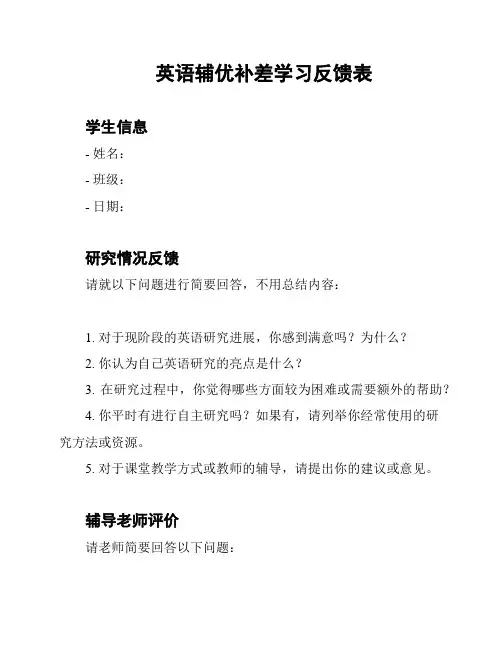
英语辅优补差学习反馈表
学生信息
- 姓名:
- 班级:
- 日期:
研究情况反馈
请就以下问题进行简要回答,不用总结内容:
1. 对于现阶段的英语研究进展,你感到满意吗?为什么?
2. 你认为自己英语研究的亮点是什么?
3. 在研究过程中,你觉得哪些方面较为困难或需要额外的帮助?
4. 你平时有进行自主研究吗?如果有,请列举你经常使用的研
究方法或资源。
5. 对于课堂教学方式或教师的辅导,请提出你的建议或意见。
辅导老师评价
请老师简要回答以下问题:
1. 对该学生的研究进展有何评价?
2. 你觉得该学生在英语研究中存在哪些潜力或亮点?
3. 你认为该学生需要在哪些方面进行重点辅导或支持?
4. 你觉得该学生在课堂上有哪些优点或需要改进的地方?
5. 你对该学生的未来研究提供哪些建议?
学生承诺
请学生签名确认以下内容:
我确认上述反馈内容属实,将根据学校要求积极配合老师的辅导与支持,并努力改进我的研究方式和能力。
学生签名:__________________
日期:__________________。
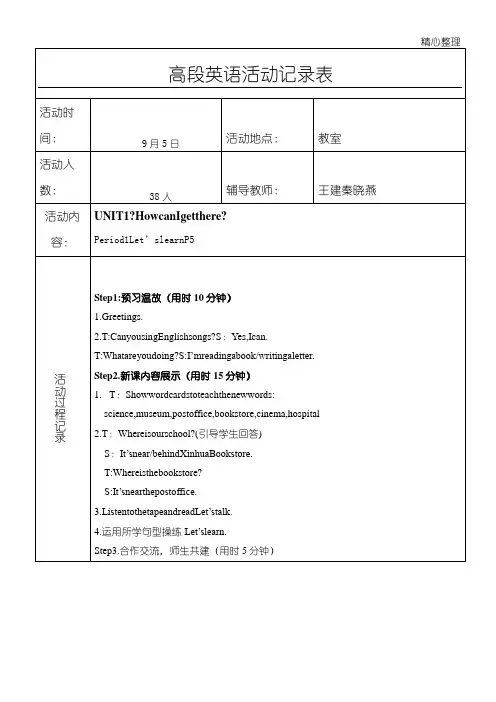
![初一英语人称代词和物主代词的表格及练习题[1]](https://uimg.taocdn.com/397cd454d1f34693dbef3e95.webp)
初一上学期期末代词复习一、人称代词表示“我”、“你”、“他"、“她”、“它"、“我们"、“你们”、“他们"的词,叫做人称代词。
人称代词有人称、数和格的变化,见下表:(1)人称代词主格:作主语,表示谁怎么样了、干什么了。
如:I am a teacher。
You are student. He is a student,too.We / You / They are students。
(2)人称代词宾格作宾语,表示动作行为的对象.如:Give it to me。
Let’s go (let’s =let us)二、物主代词表示所有关系的代词叫做物主代词,也可叫做代词所有格.物主代词分形容词性(1)形容词性物主代词( my / your / his / her / its / our / their )+名词.如:her book my teacher his bike(2)名词性物主代词则相当于“形容词性物主代词+名词”,故其后不必加名词。
如:Is this your book?No,,it isn’t, it’s hers(=her book)This pen is mine(=my pen).一、填空:1.Let _______ (I) help ______ (you)。
2。
Let _______ (we)go。
3.(I)_______ are students.4。
I can’t find _____ (they)。
5。
Give ____ (he) the book。
二、选择1.________are in the same class。
A。
Her and me B。
She and l C。
Me and her D。
l and she2。
Please call ___ at 256-5896A meB myC ID mine3。
-Do you like these computers?—No,I don’t like_______。
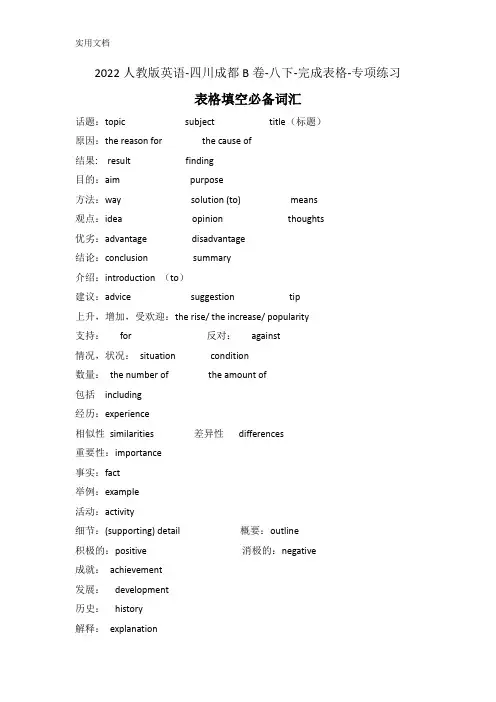
2022人教版英语-四川成都B卷-八下-完成表格-专项练习表格填空必备词汇话题:topic subject title(标题)原因:the reason for the cause of结果: result finding目的:aim purpose方法:way solution (to) means观点:idea opinion thoughts优劣:advantage disadvantage结论:conclusion summary介绍:introduction (to)建议:advice suggestion tip上升,增加,受欢迎:the rise/ the increase/ popularity支持:for 反对:against情况,状况:situation condition数量:the number of the amount of包括including经历:experience相似性similarities 差异性differences重要性:importance事实:fact举例:example活动:activity细节:(supporting) detail 概要:outline积极的:positive 消极的:negative成就:achievement发展:development历史:history解释:explanation表达:expression(s)做题总结:2空,原文能找到答案,3空要归纳总结(出题处回到原文,理解第一,尽量用原文单词或者上面常考单词)。
(一):近义词,近义句相互转换(正反转换—remember变为don’t forget);(二):主动句,被动句相互转换;(三):注意出题句与原文句子之间的差别:五大句型的词性和句式转换(四):理解原文---可能考单词表里的固定短语(五):题材---讲人1—就会有主人翁的经历(experience)2----取得的成就(achievement)3---观点,看法(thought,idea)4---总结(conclusion)题材---讲事,讲物1---文章开头---介绍,叙述事实(introduction, fact),建议和方法(advice,way)或者文章的目的(purpose)2---有故事的原因,发展或历史(reason,development,history)3---有赞成和反对(for,against),有优点和缺点(advantage和disadvantage)注意:文章的开头和结尾往往表达了作者的目的,中心思想---考---标题(专项练习一)We live in a world full of many different kinds of people. We want to get along well with others. We also want to be liked by others. The following ways will make others like you.Do This and Others Won't Dislike You AnywhereBecome really interested in other people. A show of interest must be true. It must bring good results to the person showing the interest, but also to the person getting the attention(关注). It is a two-way street — both of you get an advantage(好处)A Simple Way to Make a Good First Impression(印象)Smile(微笑) as often as possible. Your smile will show others that you are a friendly person. When someone feels stressed from his or her teachers or parents, your smile is like the sun breaking through the clouds. and your smile can help him or her realize that everything is hopeful — that there is still joy in the world If You Don't Do This. You Are Getting into TroubleRemember a person's name. A person's name is the sweetest and the most important sound in any language. We should realize the magic in a name. The name makes the person different from others; it makes him or her special among all others, you remember a person's name, the relationship between both of you will become much closetAn Easy Way to Become a Good TalkBe a careful listener first. Ask questions that other persons will like to answer. Encourage them to talk about themselves and their achievements(成就). What you need to do is just listen,because people feel happy talking about themselves.How to become a 1. __________ personWays Advantages ReasonsBecome really interested in others. It is a way to let you be 2.__________ anywhere.—Your show of interestmust be true.—It must bring goodresults to both of you.Smile as often as possible. It will help you leave agood first impression toothers —Your smile to others isa sigh of 3.__________—Your smile makes others realize that all ishopeful.Remember a person's name. It is good for the 4.__________ of therelationship between bothof you.—A person's namemakes him or herdifferent from others.—A person's name is thesweetest and the mostimportant sound in anylanguage.Listen carefully first. It will help you to talkwell with others. Talking about themselves and their achievements always brings people 5. __________答案:1. welcomed/popular2. liked3. joy4.improvement5.happiness(专项练习二)Sam hated doing chores. And he had many chores. For example, on Mondays, Wednesdays and Fridays, he took out the rubbish. And on the weekend, he always washed his father’s car. He also cleaned his own room once a week on Saturdays. What a chore that was! Sometimes he even had to look after his little sister and brother.Sam had a foreign friend at school. His name was Kumar. Doing chores in Kumar's family was very different. In the house only the girls did chores. His sisters made all the beds and cleaned all the rooms too, even his bedroom. His mother always cooked the meals, and his sisters helped their mother. So when Kumar talked to his friend Sam about chores, he felt very lucky.One day, Sam had an idea. He asked Kumar," Could I borrow your sisters?" He wanted them to help him clean his room, but they said no. Instead, they asked Sam to teach their brother how to do chores, so he could make his own bed.Sam and Kumar are very good at science. They are going to be scientists after university. They want to make a robot do the chores. Then everyone -mothers andIn Sam’s family ◆Sam took out the rubbish _____1_____◆On the weekend, he always washed his father'scar and cleaned his own room every Saturday.◆Sometimes _____2_____ his sister and brothermust also be his job.In Kumar’s family◆Things in Kumar’s family were very_____3_____. The girls did almost everything._____4_____ on doing chores ◆Sam thought Kumar was so lucky when he knewKumar didn’t do any chores at home.◆Sam asked Kumar _____5_____ his sister to himto help him clean his room.◆They want to make a robot do the chores in orderto make everyone in the family happy.答案:1. three times2. looking after3. unfair/different4. Their opinions5. to lend(专项练习三)Each nation has many good people who help to take care of others. For example, some high school and college students in the United States often spend many hours as volunteers in hospitals, orphanages or rest homes for the aged. They read books to the people in these places, or they just visit them and play games with them or listen to their problems.Other young volunteers go and work in the homes of people who are sick or old. They paint, clean up or repair their houses, mow (修剪) their lawns (草坪) or do their shopping. For boys who no longer have fathers, there is an organization called Big Brothers. College students and other men take these boys to baseball games or on fishing trips and help them to get to know things that boys usually learn from their fathers.Each city has a number of clubs where boys and girls can go to play games. Some of these clubs show films or organize short trips to the mountains or other interesting places. Most of these clubs use a lot of high school and college students as volunteers because they are young enough to understand the problems and needs of young boys and girls.V olunteers believe that some of the happiest people in the world are those who help to bring happiness to others.___1__Volunteers in the USAPlaces ActivitiesIn hospitals, orphanages or rest homes for the aged They read books to, visit and play games with the people in these places, or act as a(n) ___2___ of their problems.__3___ ●They help the sick or old people do their housework or shopping.●They help boys without fathers get to know things.In city clubs They play games with kids or help organize trips to places of__4__.It brings happiness to both others and themselves Opinions about__5__1.Young2.listener3.In the homes of people/In people's homes4.interest5.volunteering。
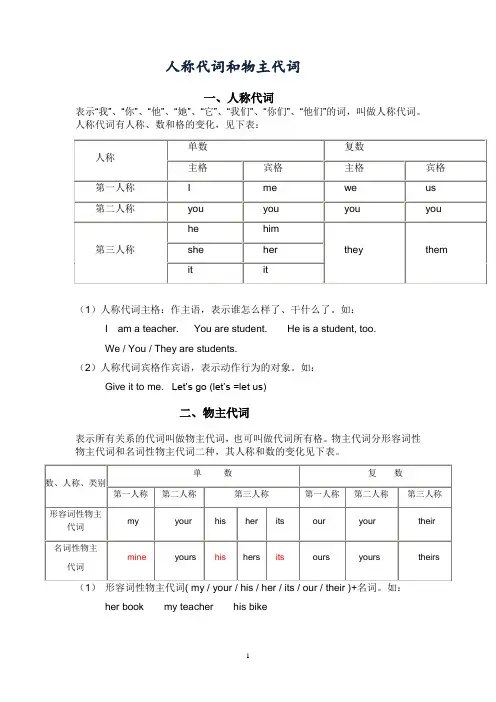
人称代词和物主代词一、人称代词表示“我”、“你”、“他”、“她”、“它”、“我们”、“你们”、“他们”的词,叫做人称代词。
人称代词有人称、数和格的变化,见下表:(1)人称代词主格:作主语,表示谁怎么样了、干什么了。
如:I am a teacher. You are student. He is a student, too.We / You / They are students.(2)人称代词宾格作宾语,表示动作行为的对象。
如:Give it to me. Let’s go (let’s =let us)二、物主代词表示所有关系的代词叫做物主代词,也可叫做代词所有格。
物主代词分形容词性物主代词和名词性物主代词二种,其人称和数的变化见下表。
her book my teacher his bike(2)名词性物主代词则相当于“形容词性物主代词+名词”,故其后不必加名词。
如:Is this your book?No,,it isn’t,it’s hers(her book)This pen is mine.人称代词与物主代词用法的练习题分类:英语习题人称代词与物主代词用法的练习题一、填表1.Let _____ (I) help ____ (you).2.Let _____ (we) go.3.(I) _____ are students.4.I can't find ____________ (they).5.Give ____________ (he) the book.三、选择1.________________are in the same class.A.Her and meB.She and lC.Me and herD.l and she2.Please call ___ at 256-5896A meB myC ID mine3.-Do you like these computers?-No,I don't like_______.A itB themC they5.Our tercher think_______are right.A.We C it D she6.______go to the party.A.He,I and youB.I, you and heC.You,I and heD.You,he and I四、用括号中的适当形式填空:(1)Are these ________(you)pencils?Yes, they are ________(our).(2)—Whose is this pencil?—It’s ________(I).(3)I love ________(they)very much.(4)She is________(I)classmate.五、代词练习:A. 写出各个代词的对应项。
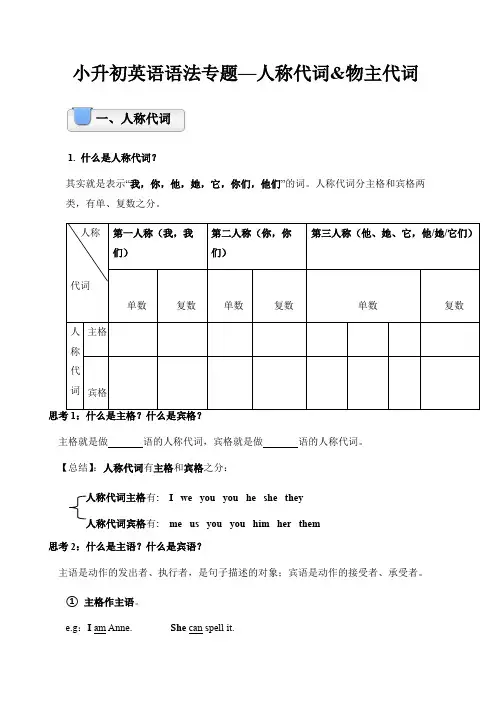
小升初英语语法专题—人称代词&物主代词1. 什么是人称代词?其实就是表示“我,你,他,她,它,你们,他们”的词。
人称代词分主格和宾格两类,有单、复数之分。
人称代词第一人称(我,我们)第二人称(你,你们)第三人称(他、她、它,他/她/它们)单数复数单数复数单数复数人称代词主格宾格思考1:什么是主格?什么是宾格?主格就是做语的人称代词,宾格就是做语的人称代词。
【总结】:人称代词有主格和宾格之分:人称代词主格有: I we you you he she they人称代词宾格有: me us you you him her them思考2:什么是主语?什么是宾语?主语是动作的发出者、执行者,是句子描述的对象;宾语是动作的接受者、承受者。
①主格作主语。
e.g:I am Anne. She can spell it.一、人称代词②宾格作宾语。
e.g:Look at me,help him练习:找出以下句子中的主语和宾语。
He is a doctor.You are my hero.It appeared in the 1990s.They love apples.Do you like cartoons?What time is it?思考3:什么时候用主格?什么时候用宾格?①主格作主语,用在动词前面。
(动词前面用主格)e.g:I am Anne. She can spell it. (主格+动词)②宾格作宾语,用在动词和介词的后面。
(在动词和介词的后面采用宾格)e.g:Look at me,(介词后+宾格)help him (动词后+宾格)练习1:完成人称代词的表格1.China is a beautiful country._________is in the east of Asia. ( its )2.What day is__________today?__________is Thursday. (its)3. __________have a blue bike.( I )4.These new houses are so nice.__________are very expensive.( them )5.Ling Ling is a girl.________studies in a primary school.(she)6.Mike is my classmate.___________is good at English. ( he )7.Kate wants a glass of milk.Will you pass it to__________? ( she )8.What’s the weather like today?______________is cloudy. ( it)9.__________is my aunt.We often visit__________. (she)10._______ are students.( he )2. 多个人称代词连用时的排序人称代词排序巧记口诀单数2、3、1,复数1、2、3,都是三人称,女后男在先。
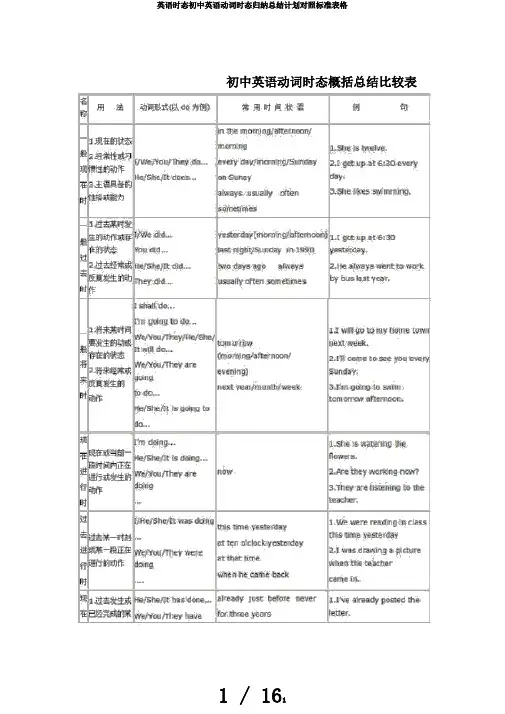
初中英语动词时态概括总结比较表初中英语时态专项练习1、一般此刻时。
往常用“usually,often,everyday,sometimes”。
一般此刻时基一、本用法介绍一般此刻时的功能1.表示事物或人物的特点、状态。
如:Theskyisblue.天空是蓝色的。
2.表示常常性或习惯性的动作。
如:Igetupatsixeveryday.我每日六点起床。
3.表示客观现实。
如:Theearthgoesaroundthesun.地球绕着太阳转。
二、一般此刻时的组成:一定句:1).主语+系动词be(is,am,are)+名词(形容词,介词短语)2).其余主语+动词原形+其余第三人称单数+动词-s+其余如:Iamaboy.我是一个男孩。
WestudyEnglish.我们学习英语。
MarylikesChinese.玛丽喜爱汉语。
三、一般此刻时的变化否认句:1)主语+be(is,am,are)+not+其余。
如:Heisnotaworker.他不是工人。
2)其余主语+donot(don’t)动词原形+其余Idon'tlikebread 第三人称单数+doesnot(doesn’t)动词原形+其余Hedoesn'toftenplay.一般疑问句:1)Be(Is,Are)+主语+其余?如:-Areyouastudent?-Yes.Iam./No,I'mnot.2)Do其余主语+动词原形+其余?Does+第三人称单数+动词原形+其余+?注意:遇I/we—you,my—your,some—any.Doesshegotoworkbybike?-Yes,shedoes./No,shedoesn't.Doyouoftenplayfootball?-Yes,Ido./No,Idon't.特别疑问句:疑问词+一般疑问句。
如:Whereismybike?Howdoesyourfathergotowork?一般此刻时用法专练:一、用括号内动词的适合形式填空。
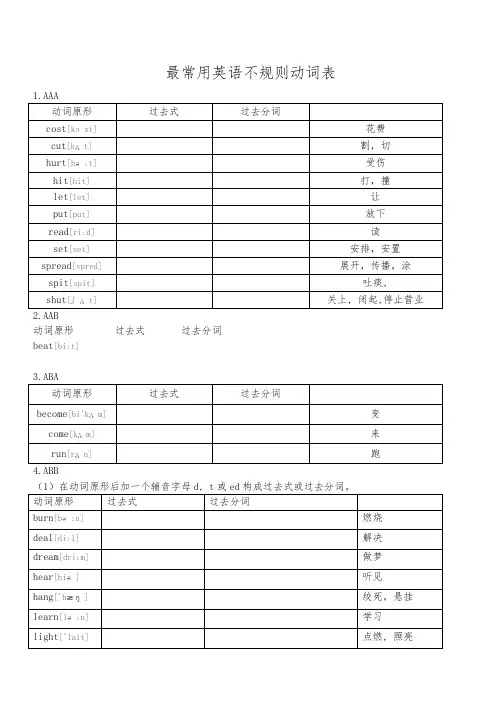
人称代词英语表格练习题Title: English Pronouns Exercise - A Journey to Mastering Personal Pronouns Introduction:In this article, we will embark on a journey to explore and master the use of personal pronouns in English. Personal pronouns play a crucial role in communication, allowing us to refer to ourselves and others in a concise and efficient manner. Through a series of exercises, we will delve into the different types of personal pronouns and their correct usage, enabling us to enhance our language skills.Body:1. Subject Pronouns:Subject pronouns are used when the pronoun is the subject of a sentence. They replace the noun that acts as the subject. Let's practice using subject pronouns with the following examples:- I went to the park yesterday.- You should try this new recipe.- He is studying for his exams.- She loves to read books.- It is raining outside.- We are going on a vacation.- They won the game.2. Object Pronouns:Object pronouns are used when the pronoun is the object of a verb or preposition. They replace the noun that receives the action. Let's practice using object pronouns with the following examples:- John gave me a present.- Can you help us with the project?- She invited him to the party.- The teacher praised her for her hard work.- The dog followed it to the park.- They saw us at the concert.- I called them yesterday.3. Possessive Pronouns:Possessive pronouns indicate ownership or possession. They replace the noun and show who owns something. Let's practice using possessive pronouns with the following examples:- This book is mine, not yours.- Is this pen yours or theirs?- His car is parked over there.- The house is hers, not his.- Its color is vibrant.- Our team won the match.- The success is theirs.Conclusion:By practicing the exercises above, we have taken a significant step towards mastering personal pronouns in English. Subject pronouns, object pronouns, and possessive pronouns are essential tools in effective communication. Understanding their correct usage will help us express ourselves more fluently and efficiently. Continue practicing and incorporating personal pronouns into your everyday conversations to further enhance your language skills. Happy learning!。
六年级下册英语专项练习英语人称代词表格及练习全国通用1. 主格和宾格:I like you. You see him. They hit us. You teach them.主格宾格主格宾格主格宾格主格宾格2.◆描画词性物主代词其后必需跟名词。
1)描画词性物主代词不能独自运用,前面必接名词,表示一切.如:•my pen我的钢笔your bag你的书包his bike他的自行车her desk她的书桌its name它的名字例句:Is that your bike? 那是你的自行车吗?Those are our books. 那些是我们的书。
◆假设名词前有描画词性物主代词,就不能同时用冠词(a, an, the)或指示代词(this,that, these, those)修饰此名词。
•[正]This is my pencil. [误]This is my a pencil.•[正]This is a pencil. [误] This is a my pencil.◆描画词性物主代词与描画词一同修饰名词时,要放在描画词之前。
如:his Englishbooks 他的英语书their Chinese friends 他们的中国冤家Mine (=My bedroom) is big, too. 你的卧室大。
我的卧室也大。
留意:在运用名词性物主代词时,必需有特定的言语环境,也就是要省略的名词大家曾经知道,曾经提起过。
例:It’s hers. 是她的。
〔独自运用大家不知是怎样回事,不可以这样用〕There is a book. It’s hers. 那有本书。
是她的。
〔先提及,大家才明白〕特别提示:汉语表达常有省略〝的〞字的习气,如:我哥哥、你们教员。
其中〝我〞和〝你们〞的实践意义区分是〝我的〞、〝你们的〞,所以英语中只能译成my brother, your teacher;而不能译成 I brother, you teacher。
小学生精编英语主格宾格所有格一览表〔知识系统原表〕主格宾格物主代词物主代词的意思是物品主人的代词。
形容词性物主代词名词性物主代词数人称表语宾语不接名词 , 做主语宾用作主语后接名词,作定语语介词宾语表语及 of连接的定语第一人称I( am) 我me 我my 我的mine 我的单第二人称you〔 are 〕你you 你your你的yours你的数He(is ) 他him 他his他的his他的第三人称She(is ) 她her 她her hers她的她的第一人称We〔 are 〕我们us 我们our我们的ours我们的复第二人称you〔are 〕你们you 你们your你们的yours你们的数themtheir theirs 第三人称they( are 〕它们他们|她们|他们的|她们的|它们的他们的|她们的|它们的它们反身代词myself your self himself her self our selves your selves themselves小学生精编英语主格宾格所有格填空练习主格物主代词物主代词的意思是物品主人的代词。
宾格名词性物主代词形容词性物主代词数人称表语宾语不接名词 , 做主语宾用作主语语后接名词,作定语介词宾语表语及 of连接的定语第一人称I( am) 我my 我的mine 我的单第二人称you〔 are 〕你your你的yours你的数He(is ) 他his他的his他的第三人称She(is ) 她her hers她的她的第一人称We〔 are 〕我们our我们的ours我们的复第二人称you〔are 〕你们your你们的yours你们的数their theirs 第三人称they( are 〕它们他们的|她们的|它们的他们的|她们的|它们的反身代词myself your self himself her self our selves your selves themselves小学生精编英语主格宾格所有格填空练习数人称第一人称单第二人称数第三人称第一人称复第二人称数第三人称主格宾格用作主语表语宾语介词宾语I( am) 我me 我you〔 are 〕你you 你He(is ) 他him 他She(is ) 她her 她We〔 are 〕我们us 我们you〔are 〕你们you 你们themthey( are 〕它们他们|她们|它们物主代词物主代词的意思是物品主人的代词。